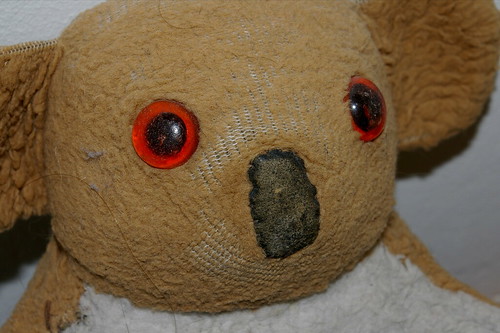I don't want to lose it again.
From: Kim PlowrightAnd today's bear:
To: Leslie Harpold
05/12/2005
Leslie,
i finally thought of one for you. It starts sad and ends happy, just
like a Jimmy Stuart film.
I can do you a photo of the bear, if that will help??
--
One of my earliest memories is of loosing my favourite teddy bear.
One winter, when I was about 3 years old I was sitting outside the butcher's on Canterbury High Street in my pushchair. My mum was inside.
(The butcher, by the way, was in an Elizabethan half timbered building, and still had sawdust on the floor in those days; it's a 'Thornons' chain chocolate shop these days...)
As two-year-olds tend to do, I dropped Koko, a stuffed Koala bear that my Dad bought for me when I was newborn, over the edge of my pushchair.
(My pushchair, incidentally, was black metal and a kind of deep turquoise vinyl, and smelt of plastic. This is a pretty strong memory, can you tell?)
I cried, loudly. My mum came out to see what was wrong.
Anyway - she saw that I didn't have my bear, and looked around on the ground. No bear. anywhere. Gone. Someone had picked up a teddy bear from next to the puschair of a screaming child, and taken it.
I was inconsolable.
It must have been shortly before christmas, because my Dad decided to replace my Koala with one from Santa, as a lovely surprise. He looked everywhere for a Koala that was identical to the one I'd lost. He scoured toyshops all over Canterbury, and got more and more upset; all of the bears had black scratchy plastic paws, which my bear didn't. He tells me he he was nearly in tears over his failure to find a matching bear; it was one of those 'I will be a good parent' things.
Eventually, on Christmas eve, in desperation, he bought the only Koala he could find. Its nose was brown, which was wrong; so he coloured in the nose with permanent marker pen. Just before he went to wrap it up, he looked at this bear's paws, and though 'I don't like them, they're a bit sharp, not really suitable for a small child; I'll cut them off.'
As he scissored away the paws, he remembered he'd done exactly the same thing with the original bear he's bought. He'd been looking for the wrong bear.
On Christmas morning, I got my Koko back, and I loved him more than anything; I didn't notice the difference. Even now, thirty years later, Koko sits at the end of my bed, and you can just about see the marker pen stripes on his scuffed leather nose.
And Koko reminds me what a wonderful, caring man my Father is, and that he'd go to great, great lengths to make the world just so for me.
In case you missed it. Well done Internet! @laurenannbishop @Spottedontrain Kings Cross Teddy's family has been found pic.twitter.com/iSqv7x0n2O
— Lost Teddy Bear (@lostteddybear) December 15, 2013

